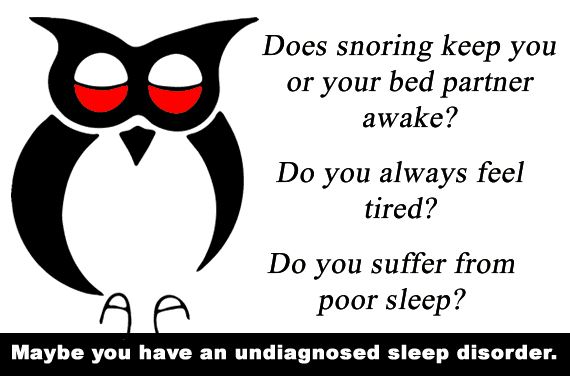
Do you have Sleep Apnea ?
Sleep Apnea (Apnoea)
Apnea means absence of breath. Obstructive Sleep Apnea (often just called sleep apnea, or sometimes OSA) occurs when the airway collapses during sleep and the person stops breathing.
Obstructive sleep apnea affects more than 5% of the population and is the result of an obstruction to the airway, usually as the result of a narrow airway collapsing or becoming blocked when muscles relax during sleep.
The person with sleep apnea may have hundreds of these episodes throughout the night, disrupting their sleep and starving the body of vital oxygen.
Fortunately an effective treatment called CPAP (Continuous Positive Airway Pressure) is available which will allow the person to lead a normal healthy life.
Symptoms of Sleep Apnea
People with obstructive sleep apnea usually snore loudly and have restless sleep.
Often these symptoms are not noticed by the person with sleep apnea, but by their partner or work colleague, who may also notice frequent pauses in breathing and snoring, lasting between 10 seconds and a minute.
Each pause ends with a deep gasping noise and brief awakening as the person struggles to breathe, although the person doesn’t usually remember awakening. As a result of the problems during sleep, the person with sleep apnea is usually very tired during the day, and as the day progresses, they may struggle to stay awake.
Who Gets Sleep Apnea?
Sleep apnea can occur at any age. In childhood, it is commonly the result of enlarged tonsils or adenoids. In adulthood, it occurs more often in middle age, and is more common in men than in women. It is often associated with being overweight, particular with excess fatty tissue around the neck. In people not overweight, it is likely that they have been born with a narrow airway, or a facial structure which leads to narrowing.
Almost everyone who has obstructive sleep apnea will snore, as snoring is also the result of narrow or floppy upper airways.
If this sounds like you, or someone you know please consult your doctor to discuss the possibility that you may have a sleep disorder that needs diagnosis and treatment.
Sleep Disorders Australia (SDA)
If you found this information useful, perhaps you would consider becoming a member of Sleep Disorder Australia (SDA)
SDA is a voluntary group offering assistance and support to those persons and their families who are living with sleep disorders throughout Australia.
Disclaimer
Information provided in this article is general in content and should not be seen as a substitute for professional medical advice. Concerns about sleep problems or other medical conditions should be discussed with your doctor.




